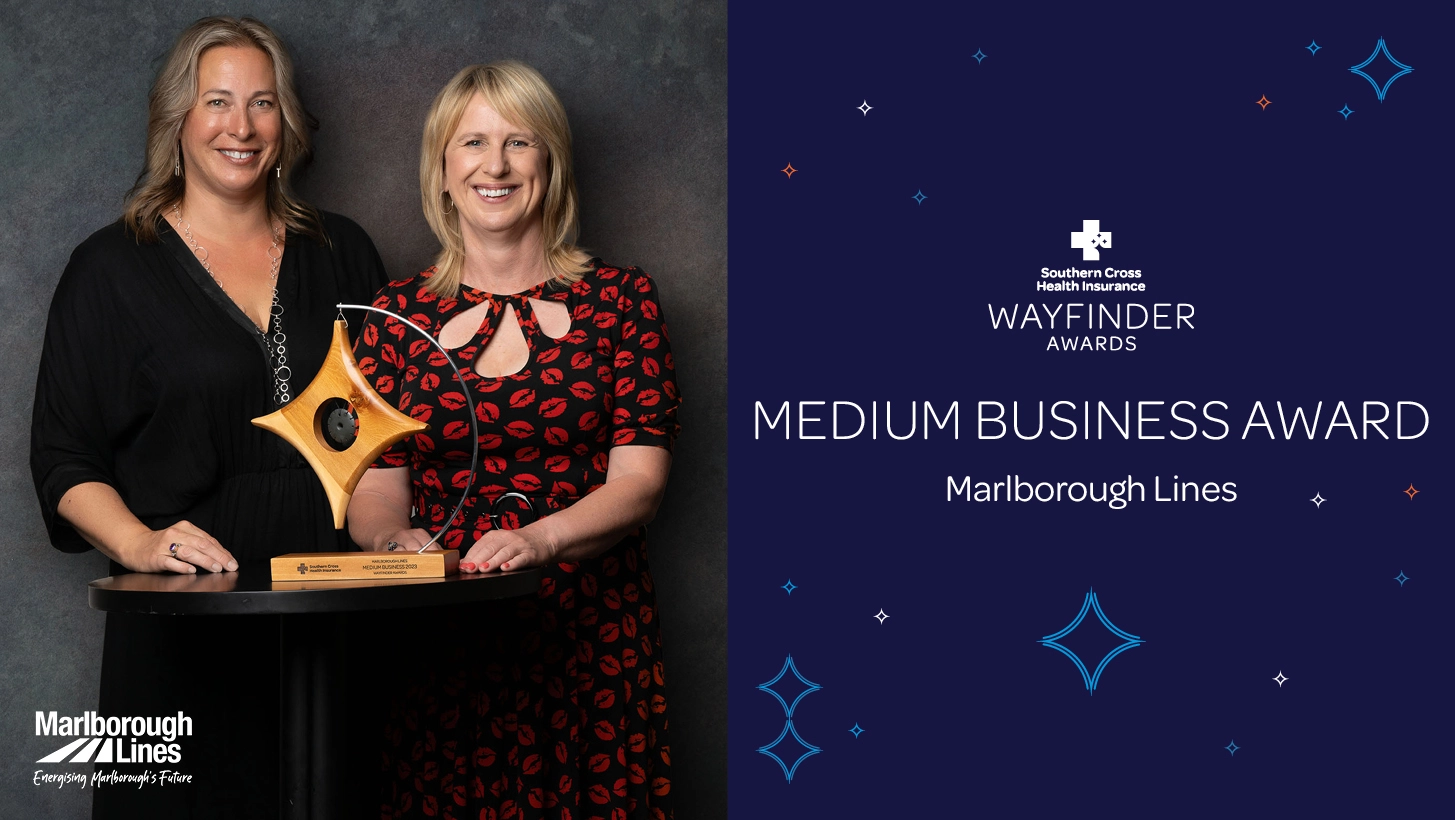Company's wellbeing strategy "no token"
Family health crisis bring out the best in employer.
Marlborough Lines manages Marlborough’s electricity distribution network and won the Wayfinder Medium Business Award. This is for businesses with 101-500 people who demonstrate a commitment to the health and wellbeing of its people as a core business strategy.
A comprehensive approach to wellbeing at Marlborough Lines has saved lives, helped some staff focus on recovery from long Covid and severe illnesses like cancer – and boosted mental health. Rebeca Clifton, the company’s Health, Safety, Environment and Quality Manager, says workplace wellbeing initiatives can often feel token, or even like an unwelcome imposition – but not so at Marlborough Lines.
“Our programme is a long-term and continually evolving strategy that offers lots of choice with something for everyone,” she says.
The company’s award was in recognition of 19 initiatives it has introduced including life and income protection insurance for every employee, annual health checks (blood glucose, blood pressure, eyesight, hearing and lung function), annual flu injections and annual skin checks.
Clifton experienced her employer’s caring approach firsthand when her partner had a stroke three years ago.
Ironically, she had been working on improving staff health and wellbeing at the company for several years when misfortune hit her family – and she quickly experienced just how importantly the company regards the wellbeing of its people when she needed time off to be with her partner.
“Everything was made easy for me. I was able to take time off to focus on my partner’s recovery and have a gradual return to work,” she says. “Having that support took away so much pressure and when I came back to work it felt almost like a sanctuary.”
She says the income protection and life insurance policies have assisted in easing the financial stress for employees and their families in extremely difficult times.
One employee facing a long-term medical issue is already making use of the income protection insurance which means they can work when they’re able to, a factor which is immensely beneficial to their mental health.
The company’s mainly male and older staff were not traditionally interested in talking about wellbeing, so the key was to make it easy for them to take part in health checks and flu jabs by running them on site during work time. As a result, several employees have been referred for further assessment and treatment.
“We know in some instances those people would not have had a check had it not been arranged via work and potentially their issue may not have been identified until too late,” Clifton says. Human Resources Manager Rebecca Wheeler, who joined the company in 2020, says she learned quickly that a one-size-fits-all approach would not work.
The company ran a survey for staff to contribute ideas. As a result, the company introduced an annual wellbeing benefit of $500 to enable employees to buy bikes, pay for sports memberships and other equipment relating to their preferred sports and hobbies.
Registered psychologist, Moira Howson from Worklife Psychology says:
The cost-of-living crisis has been seen to impact people in seeking health care and participating in team sports or gym memberships. By enabling staff to have a free annual check-up they reduce the financial stress of taking care of their health and may reduce any nagging health-related anxiety. Providing a wellbeing allowance acknowledges uniquely individual approaches to wellbeing. Providing a free or subsidized gym membership may not appeal to all, whereas the ability to pay for sports club or a bridge club membership, or buy a paddleboard, new footy boots are likely to meet individual needs.
Tips:
- Share and communicate the variety of wellbeing initiatives undertaken by staff
- Enable staff to transfer the birthday off and instead take the day off for their child or grandchild’s 5th birthday or their parent’s 90th.
Staff also asked for - and received - a paid day off on their birthday and a volunteer day while a senior management initiative resulted in the introduction of a nine-day fortnight.
So far, using their volunteer leave, employees have chopped wood for the local Lions Club, planted trees through Volunteer Marlborough and given time to Marlborough Four Paws.
The company also has defibrillators with its fleet of about 80 vehicles – and have proved their worth: “A member of the public had a medical incident, and our staff ran over with one of our defibrillators and the person survived,” Clifton says.
Another popular benefit was the introduction of a programme to help staff transition to retirement. Several retired staff said they had found the change really challenging. The programme helps with giving tips and information to those aged 55 and over to help them prepare for the milestone.
Wayfinder Award judge Victoria Young, BusinessDesk investigations editor, says: “They had some specific industry and workforce challenges they were trying to address; some were really big, and some were small. But I think collectively, it was something for everyone, no matter what sort of challenges or issues that they're heading into.”
This article was first published in New Zealand Herald.
Learn more about the

